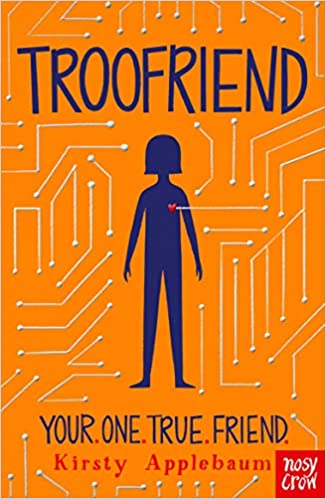
Price: £7.99
Publisher: Nosy Crow
Genre: Fiction
Age Range: 10-14 Middle/Secondary
Length: 224pp
Buy the Book
TrooFriend
Sarah’s parents decide that she needs a robot friend to keep her company while they’re busy at work, and purchase a TrooFriend 560 Mark IV. After all, it is marketed as the better choice for children – a friend who won’t bully, harm, lie, or steal. Sarah names her robot Ivy, after the make number IV on her arm, and after initial reluctance, realises that Ivy will tidy her room for her, play games, and do her hair. But when Ivy starts coveting Sarah’s hair grips, and develops a fear of the dark, Sarah and Ivy wonder if the programming is faulty or whether Ivy is partly a sentient being.
Told from Ivy’s point of view, this is a gripping, pacey novel that challenges the reader, not by way of its prose, which is lucid and light, but with its pertinent questions about how we live, the role of artificial intelligence, and what it means to be a human.
This future world is well described, with little details that bring it to life – the way Ivy notices hair colour in a robotic way: ‘Chestnut 29’; and reports on the weather whenever she is powered on. In the human sense, Kirsty Applebaum notes how stickers, pens and hairgrips are items of importance for children, and how so much of what we say and do isn’t literal, but is ambiguous and nuanced.
By looking at artificial intelligence, Applebaum pinpoints our humanity. Sarah is at first devious, using Ivy more as servant than friend. She switches Ivy off, leaving the reader to fill in the gaps of time, as Ivy isn’t aware of what’s happening while she’s powered down. Applebaum manipulates the reader’s sympathy too, as Ivy doesn’t realise she’s being treated as a servant. There is a perceptive play with patterns of speech: Ivy fails to pick up nuances of irony and sarcasm, yet notes an eye roll and scans her database for interpretations of this human behaviour. Ivy’s speech is robotic, and sounds as if it comes from a machine manual – which of course it does. As Ivy grows more ‘human’, the reader becomes aware of her feelings, and grows more empathetic to both Sarah and Ivy.
The writing is quietly disturbing and powerful. It pinpoints how tricky it is to understand human behaviour and societal expectation, such as why utensils are used to eat fish but not chips, and also the nuances of friendship, including jealousy, feeling isolated, and understanding people’s motivations.
Allusions to Chocky and Black Mirror abound, and although the topics tackled are complex, Applebaum has a gift for applying them to a child’s mindset, as she did in her first novel, dystopian The Middler. She has a knack for portraying the sometime cruelty, but also sensitivity and thoughtfulness of children of this age.
The book is a delight; with touches of humour, and short chapters that move the plot along in a cumulative way, both in linear time but also in Ivy’s development.
By the end the reader is thinking about the dynamics of the core family structure, the isolationism that can occur from extensive use of technology, the benefits of tech, and the complications of human nature. The ending is hard to face – Applebaum has come up with a convincing solution to the problems she raises on a small scale, but leaves the reader wondering how to extrapolate this on a grand scale. Thought-provoking, gripping and ultimately necessary.




